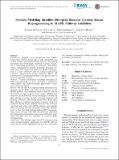| dc.contributor.author | Meyer, Aaron S. | |
| dc.contributor.author | Claas, Allison Mary | |
| dc.contributor.author | Atta, Lyla H. | |
| dc.contributor.author | Gordonov, Simon | |
| dc.date.accessioned | 2018-12-13T21:44:56Z | |
| dc.date.available | 2018-12-13T21:44:56Z | |
| dc.date.issued | 2018-07 | |
| dc.identifier.issn | 1865-5025 | |
| dc.identifier.issn | 1865-5033 | |
| dc.identifier.uri | http://hdl.handle.net/1721.1/119648 | |
| dc.description.abstract | Introduction: Targeted cancer therapeutics have demonstrated more limited clinical efficacy than anticipated, due to both intrinsic and acquired drug resistance. Underlying mechanisms have been largely attributed to genetic changes, but a substantial proportion of resistance observations remain unexplained by genomic properties. Emerging evidence shows that receptor tyrosine kinase (RTK) reprogramming is a major alternative process causing targeted drug resistance, separate from genetic alterations. Hence, the contributions of mechanisms leading to this process need to be more rigorously assessed.
Methods: To parse contributions of multiple mechanisms to RTK reprogramming, we have developed a quantitative multi-receptor and multi-mechanistic experimental framework and kinetic model.
Results: We find that RTK reprogramming mechanisms are disparate among RTKs and nodes of intervention in the MAPK pathway. Mek inhibition induces increased Axl and Her2 levels in triple negative breast cancer (TNBC) cells while Met and EGFR levels remain unchanged, with Axl and Her2 sharing re-wiring through increased synthesis and differing secondary contributing mechanisms. While three Mek inhibitors exhibited mechanistic similarity, three Erk inhibitors elicited effects different from the Mek inhibitors and from each other, with MAPK pathway target-specific effects correlating with Erk subcellular localization. Furthermore, we find that Mek inhibitor-induced RTK reprogramming occurs through both BET bromodomain dependent and independent mechanisms, motivating combination treatment with BET and Axl inhibition to overcome RTK reprogramming.
Conclusions: Our findings suggest that RTK reprogramming occurs through multiple mechanisms in a MAPK pathway target-specific manner, highlighting the need for comprehensive resistance mechanism profiling strategies during pharmacological development. Keywords: Triple negative breast cancer, EGFR, Her2, Met, Axl, Mek inhibition, Erk inhibition, BET inhibition | en_US |
| dc.publisher | Springer US | en_US |
| dc.relation.isversionof | https://doi.org/10.1007/s12195-018-0542-y | en_US |
| dc.rights | Creative Commons Attribution | en_US |
| dc.rights.uri | http://creativecommons.org/licenses/by/4.0/ | en_US |
| dc.source | Springer US | en_US |
| dc.title | Systems Modeling Identifies Divergent Receptor Tyrosine Kinase Reprogramming to MAPK Pathway Inhibition | en_US |
| dc.type | Article | en_US |
| dc.identifier.citation | Claas, Allison M., Lyla Atta, Simon Gordonov, Aaron S. Meyer, and Douglas A. Lauffenburger. “Systems Modeling Identifies Divergent Receptor Tyrosine Kinase Reprogramming to MAPK Pathway Inhibition.” Cellular and Molecular Bioengineering 11, no. 6 (July 26, 2018): 451–469. © 2018 The Authors | en_US |
| dc.contributor.department | Massachusetts Institute of Technology. Department of Biological Engineering | en_US |
| dc.contributor.mitauthor | Claas, Allison Mary | |
| dc.contributor.mitauthor | Atta, Lyla H. | |
| dc.contributor.mitauthor | Gordonov, Simon | |
| dc.relation.journal | Cellular and Molecular Bioengineering | en_US |
| dc.eprint.version | Final published version | en_US |
| dc.type.uri | http://purl.org/eprint/type/JournalArticle | en_US |
| eprint.status | http://purl.org/eprint/status/PeerReviewed | en_US |
| dc.date.updated | 2018-12-05T05:12:24Z | |
| dc.language.rfc3066 | en | |
| dc.rights.holder | The Author(s) | |
| dspace.orderedauthors | Claas, Allison M.; Atta, Lyla; Gordonov, Simon; Meyer, Aaron S.; Lauffenburger, Douglas A. | en_US |
| dspace.embargo.terms | N | en_US |
| dc.identifier.orcid | https://orcid.org/0000-0003-1224-8153 | |
| dc.identifier.orcid | https://orcid.org/0000-0001-6284-2711 | |
| mit.license | PUBLISHER_CC | en_US |
